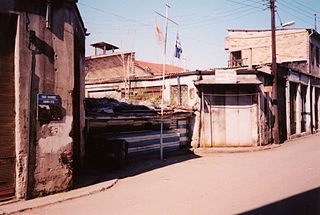
United Nations Security Council Resolution 1680, adopted on May 17, 2006, after recalling previous resolutions on Lebanon, including 425 (1978), 426 (1978), 520 (1982), 1559 (2004) and 1655 (2005), the Council strongly encouraged Syria to respond positively to Lebanon's request to delineate borders and establish diplomatic relations, with the purpose of asserting Lebanon's sovereignty, territorial integrity and political independence.
United Nations Security Council Resolution 143 was adopted on July 14, 1960. With Congolese requests for assistance in front of him, following the Mutiny of the Force Publique, Secretary-General of the United Nations Dag Hammarskjöld had called a meeting for the evening of July 13, acting under Article 99 of the Charter. After the Secretary-General's report and a request for military assistance by the President and Prime Minister of the Republic of the Congo (Leopoldville) to protect its territory, the Council called upon Belgium to withdraw its troops from the territory and authorized the Secretary-General to take the necessary steps to provide the Government with such military assistance that the national security forces may be able to meet fully their tasks. The Council asked the Secretary General to report to the Security Council as appropriate.

United Nations Security Council Resolution 340 was adopted on October 25, 1973, during the Yom Kippur War. It was passed after the Security Council was informed of the apparent failure of UNSCR 338 and UNSCR 339 to end the fighting.

United Nations Security Council resolution 852, adopted unanimously on 28 July 1993, after recalling previous resolutions on the topic including 501 (1982), 508 (1982), 509 (1982) and 520 (1982) as well as studying the report by the Secretary-General on the United Nations Interim Force in Lebanon (UNIFIL) approved in 426 (1978), the Council decided to extend the mandate of UNIFIL for a further six months until 31 January 1994.

United Nations Security Council resolution 935, adopted unanimously on 1 July 1994, after recalling all resolutions on Rwanda, particularly 918 (1994) and 925 (1994), the Council requested the Secretary-General Boutros Boutros-Ghali to establish a Commission of Experts to investigate violations of international humanitarian law during the Rwandan genocide.

United Nations Security Council resolution 969, adopted unanimously on 21 December 1994, after recalling resolutions 186 (1964), 831 (1993) and 889 (1993), the Council expressed concern at the lack of progress in the political dispute in Cyprus and extended the mandate of the United Nations Peacekeeping Force in Cyprus (UNFICYP) until 30 June 1995.

United Nations Security Council resolution 1169, adopted unanimously on 27 May 1998, after considering a report by the Secretary-General Kofi Annan regarding the United Nations Disengagement Observer Force (UNDOF), the Council extended its mandate for a further six months until 30 November 1998.

United Nations Security Council resolution 1211, adopted unanimously on 25 November 1998, after considering a report by the Secretary-General Kofi Annan regarding the United Nations Disengagement Observer Force (UNDOF), the Council extended its mandate for a further six months until 31 May 1999.

United Nations Security Council resolution 1243, adopted unanimously on 27 May 1999, after considering a report by the Secretary-General Kofi Annan regarding the United Nations Disengagement Observer Force (UNDOF), the Council extended its mandate for a further six months until 30 November 1999.

United Nations Security Council resolution 1250, adopted unanimously on 29 June 1999, after reaffirming all resolutions on the situation in Cyprus, particularly Resolution 1218 (1998), the Council addressed the Secretary-General Kofi Annan's mission of good offices in Cyprus.

United Nations Security Council resolution 1276, adopted unanimously on 24 November 1999, after considering a report by the Secretary-General Kofi Annan regarding the United Nations Disengagement Observer Force (UNDOF), the Council extended its mandate for a further six months until 31 May 2000.

United Nations Security Council resolution 1363, adopted unanimously on 30 July 2001, after reaffirming all resolutions on the situation in Afghanistan, including resolutions 1267 (1999) and 1333 (2000), the Council requested the Secretary-General to establish a mechanism to monitor the implementation of sanctions against the Taliban.

United Nations Security Council resolution 1568, adopted unanimously on 22 October 2004, after reaffirming all resolutions on the situation in Cyprus, particularly Resolution 1251 (1999), the council extended the mandate of the United Nations Peacekeeping Force in Cyprus (UNFICYP) for an additional period until 15 June 2005.

United Nations Security Council Resolution 1648, adopted unanimously on 21 December 2005, after considering a report by the Secretary-General Kofi Annan regarding the United Nations Disengagement Observer Force (UNDOF), the Council extended its mandate for a further six months until 30 June 2006.

United Nations Security Council Resolution 1664 was adopted unanimously on March 29, 2006; after recalling resolutions 1595 (2005), 1636 (2005) and 1644 (2005), the Council requested the Secretary-General Kofi Annan to consult with the Lebanese government concerning the establishment of an international tribunal to try those responsible for the assassination of Prime Minister Rafic Hariri and 22 others in February 2005.

United Nations Security Council Resolution 1685 was adopted unanimously on June 13, 2006. After considering a report by Secretary-General Kofi Annan regarding the United Nations Disengagement Observer Force (UNDOF), the Council extended its mandate for a further six months, until December 31, 2006.

United Nations Security Council Resolution 1830 was unanimously adopted on 7 August 2008.

United Nations Security Council Resolution 1814 was unanimously adopted on 15 May 2008. The resolution called for the United Nations to provide economic, political and technical support to Somalia, with a possible UN peacekeeping force.

United Nations Security Council Resolution 1888 was unanimously adopted on 30 September 2009. It was introduced by United States Secretary of State Hillary Clinton, who also presided over the session. The resolution established the United Nations Special Representative on Sexual Violence in Conflict.
United Nations Security Council Resolution 1829 was unanimously adopted on 4 August 2008.















